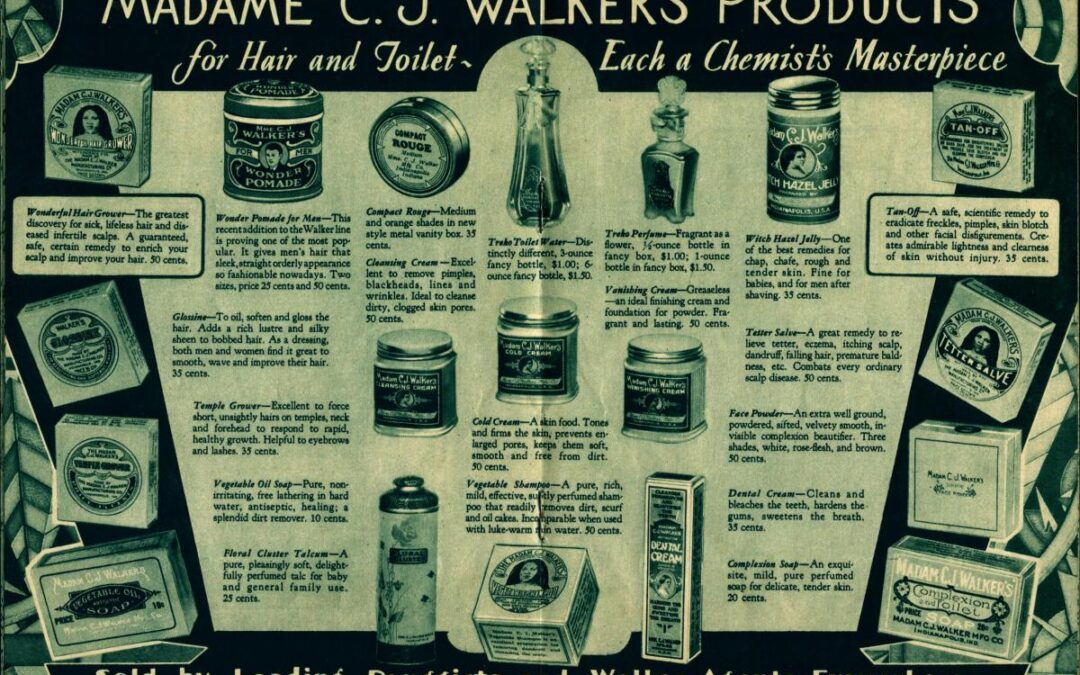They say necessity is the mother of invention, and that couldn’t be truer in the story of Madam C.J. Walker, one of the most influential inventors in American history. When faced with a need that the market hadn’t met, she created a solution—not just for herself, but for thousands of others. Her journey from washerwoman to millionaire exemplifies how personal struggles can inspire groundbreaking inventions. It’s a story of resilience, innovation, and the power of solving problems that others also face.
The Path to Becoming an Inventor
The most successful inventions often come from a deep, personal need. When people encounter problems in their daily lives, they are uniquely positioned to create solutions. This is evident in stories like Julie Austin, who invented a wrist water bottle to meet her own needs before finding that many others could benefit from it. Similarly, Madam C.J. Walker’s journey began with a problem that was deeply personal—hair loss.
Madam C.J. Walker, born Sarah Breedlove in 1867 to former slaves, faced significant challenges from an early age. Working as a washerwoman, her hair was frequently exposed to harsh conditions, including lye soap and hot steam. This exposure contributed to severe hair damage and eventual hair loss, a struggle shared by many Black women at the time. In an era when indoor plumbing was rare for Black households, frequent washing and hair care were luxuries many couldn’t afford. Walker’s struggles led her to a revelation: if she could create a product to solve her own hair issues, she could help others facing the same problem. Learn more about her early life here.
Inventor Madam C.J. Walker: A Problem Solver at Heart
Madam C.J. Walker refused to settle for temporary fixes like head wraps to hide her thinning hair and bald spots. Instead, she sought a real solution. She found a promising line of haircare products created by another Black woman, Annie Turnbo, and initially became a sales representative for Turnbo’s products. While working as a sales rep, Walker encountered a pharmacist who helped reverse-engineer Turnbo’s formula, offering ideas on how to improve it. Walker then created her own hair care formula, which became the foundation for her future business empire.
The originality of her invention has sometimes been questioned because of her initial connection to Turnbo’s products. However, innovation often involves building upon existing ideas and making them better. In this way, Madam C.J. Walker exemplifies the iterative process of invention. The story highlights a common debate in the world of invention: should credit go to the person who originated the idea or to the one who improved upon it and made it successful? As Julie Austin points out, sometimes the success of an invention depends as much on effective marketing as it does on the invention itself. Discover more about another impactful innovator, the inventor of the cassette tape.
The Birth of an Innovative Business Model
Madam C.J. Walker didn’t just invent hair care products; she also pioneered a new business model that empowered Black women across the country. She traveled extensively throughout the South, promoting her products through live demonstrations of what became known as the “Walker Method.” This method involved using her own hair products alongside a heated comb to create smoother, healthier hair.
To scale her business, Walker started manufacturing her products and training other women to sell them. These “Walker Agents” became well-known in Black communities for their expertise in beauty care and for representing Walker’s philosophy of “cleanliness and loveliness.” This approach wasn’t just about making sales—it was about elevating the social and economic status of Black women. Her entrepreneurial spirit and focus on empowering others became central to her success. Explore more about Walker’s business impact.
Inventing Solutions and Building a Legacy
Madam C.J. Walker’s story serves as a powerful example of how invention and entrepreneurship can intersect to create lasting change. Her ability to identify a common problem, develop a solution, and build a business around it transformed the beauty industry for Black women. But her impact went beyond hair care. She used her success to advocate for social and economic progress, establishing educational scholarships and supporting civil rights initiatives. For more details on Walker’s achievements, visit this resource.
Walker’s journey was not without challenges. As she grew her company, she faced skepticism from some who questioned whether her innovations were truly original. Nevertheless, her ability to adapt and improve upon existing ideas—combined with her marketing acumen—allowed her to rise above the doubts. In this way, she demonstrated that being an inventor isn’t just about coming up with a new idea; it’s about making that idea work and turning it into something that improves lives.
The Importance of Problem-Solving in Invention
Inventors like Madam C.J. Walker and others prove that the best solutions come from a willingness to solve problems that others may overlook. Walker’s drive to improve her own circumstances laid the foundation for a product line that addressed a widespread need in her community. Her products weren’t just about hair care—they were about self-confidence and dignity. In her time, many Black women faced discrimination and limited opportunities. Walker’s products, and the independence they provided to her agents, offered a path toward economic empowerment.
Her story reminds us that great inventions often start with a personal problem. Many other inventors, from those who designed life-saving medical devices to those who created everyday conveniences, began their journeys with a simple question: How can I make this better? This mindset, combined with persistence, can transform an idea into a successful innovation. For more insights into the process of invention, explore the story of the cassette tape.
Inventor Madam C.J. Walker: A Lasting Impact on Innovation and Empowerment
Madam C.J. Walker’s contributions to the beauty industry, and her pioneering role as an inventor and business leader, continue to resonate today. She built a thriving business, improved the lives of countless Black women, and set an example for future generations of entrepreneurs. Her story is a testament to the power of innovation, resilience, and the willingness to challenge the status quo.
In a time when the world faces rapid changes and new challenges, Walker’s example reminds us that innovation doesn’t always come from grand laboratories or massive corporations. Sometimes, it starts with one person identifying a need and deciding to make a difference. Madam C.J. Walker’s legacy endures, not just because of the products she created, but because of the hope, opportunity, and empowerment she provided to others.
Learn More About the Power of Invention with Julie Austin
Are you inspired by the story of Madam C.J. Walker and her path to becoming a successful inventor? Dive deeper into the world of innovation and discover how you can bring your own ideas to life with insights from Julie Austin. Learn about the principles of inventive thinking and how to turn your unique ideas into reality. Visit Creative Innovation Group today to start your journey toward innovation and success.
FAQ: Inventor: Madam C.J. Walker
Q1: What did Madam C.J. Walker invent?
Madam C.J. Walker is best known for creating a line of hair care products designed for Black women, including scalp treatments and hair growth formulas. Her innovative “Walker Method” combined her products with a heated comb to improve hair health. Learn more about her journey here.
Q2: How did Madam C.J. Walker become an inventor?
Walker’s journey as an inventor began when she struggled with hair loss while working as a washerwoman. She developed her own formulas to address her hair problems and later built a successful business around these products. Her story exemplifies how necessity can lead to invention. Read more here.
Q3: Why is Madam C.J. Walker considered a pioneer in the beauty industry?
Walker is considered a pioneer because she not only created effective hair care solutions but also established a business model that empowered other Black women. Her “Walker Agents” sold products door-to-door, providing economic opportunities to many women in Black communities. Explore her business model.
Q4: What challenges did Madam C.J. Walker face as an inventor?
Walker faced challenges related to competition, skepticism about her products, and the difficulties of scaling a business as a Black woman in the early 1900s. Despite these obstacles, she built a thriving company and became a role model for future generations of inventors.
Q5: How did Madam C.J. Walker’s inventions impact her community?
Walker’s products offered Black women solutions to common hair care issues and helped boost their self-confidence. Her success as an entrepreneur also created economic opportunities for many women in Black communities, allowing them to gain financial independence.

